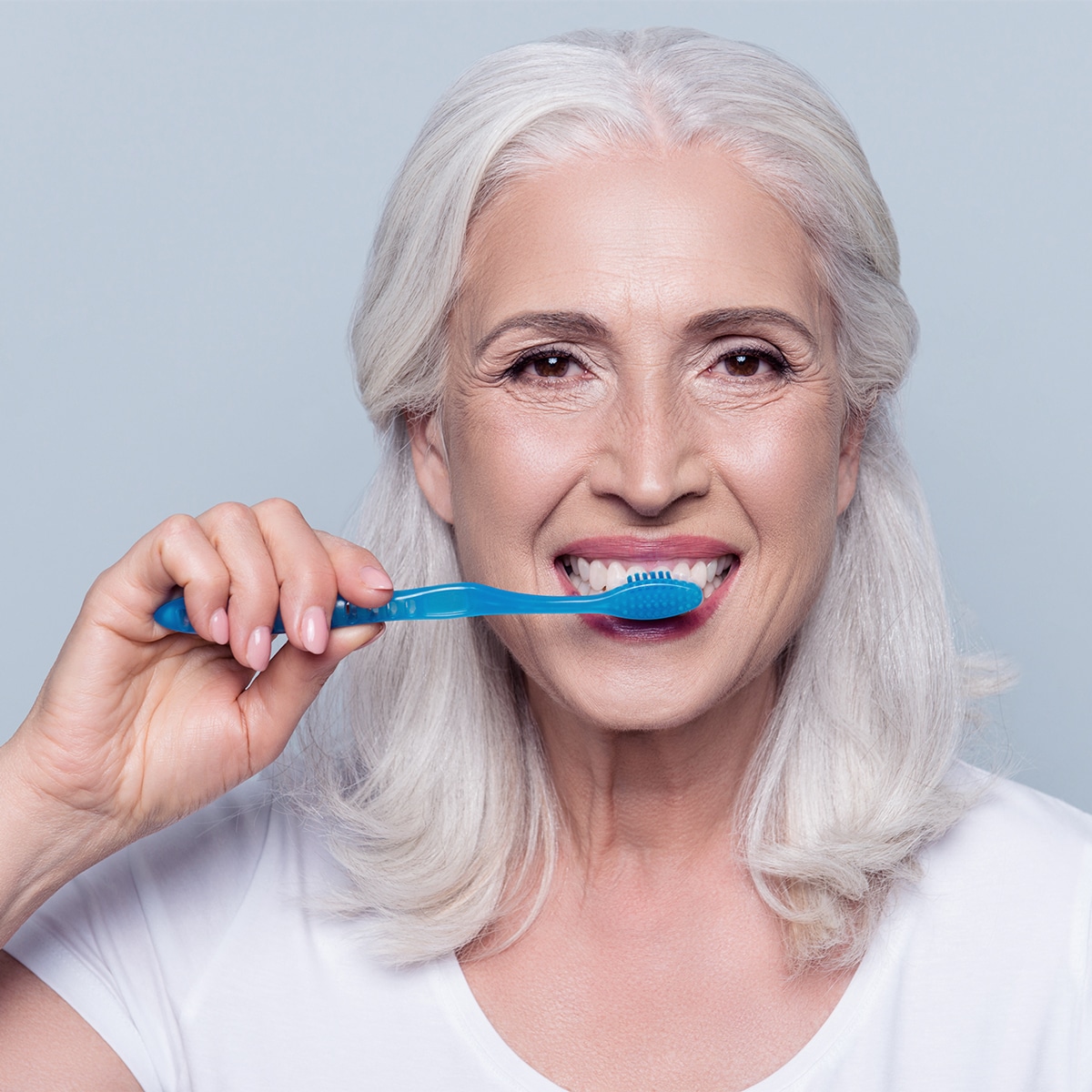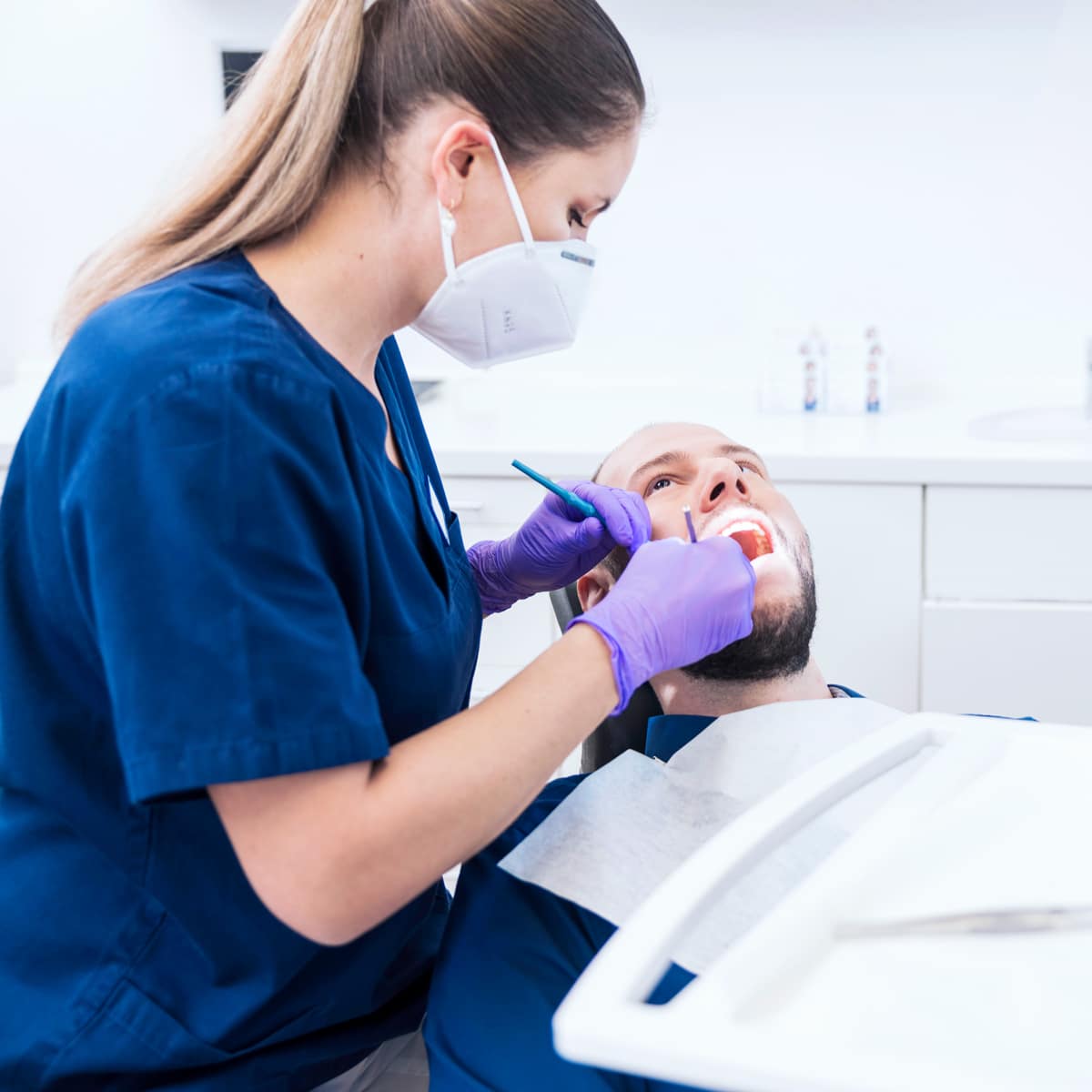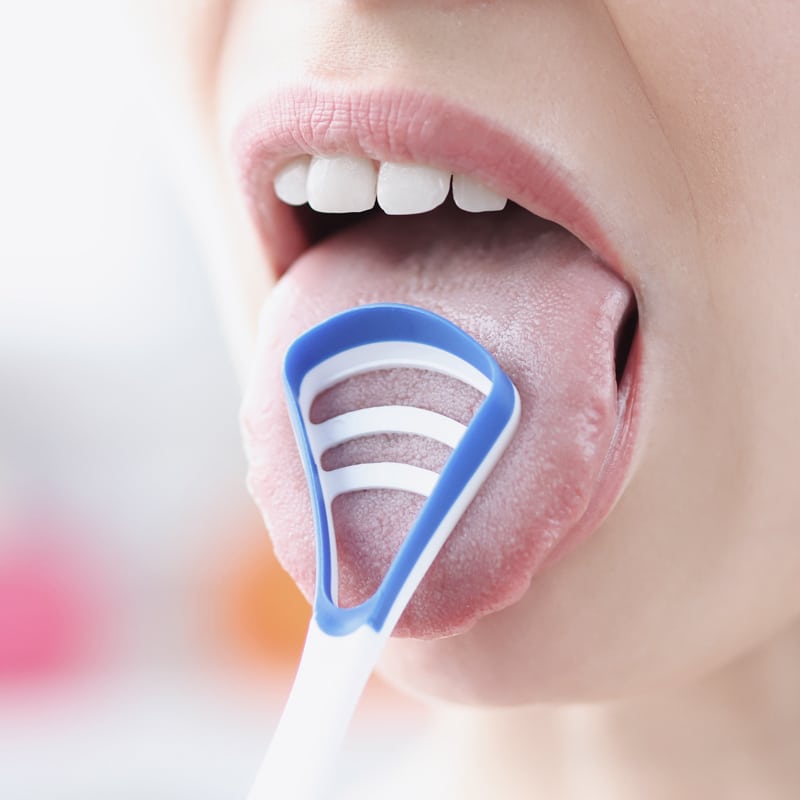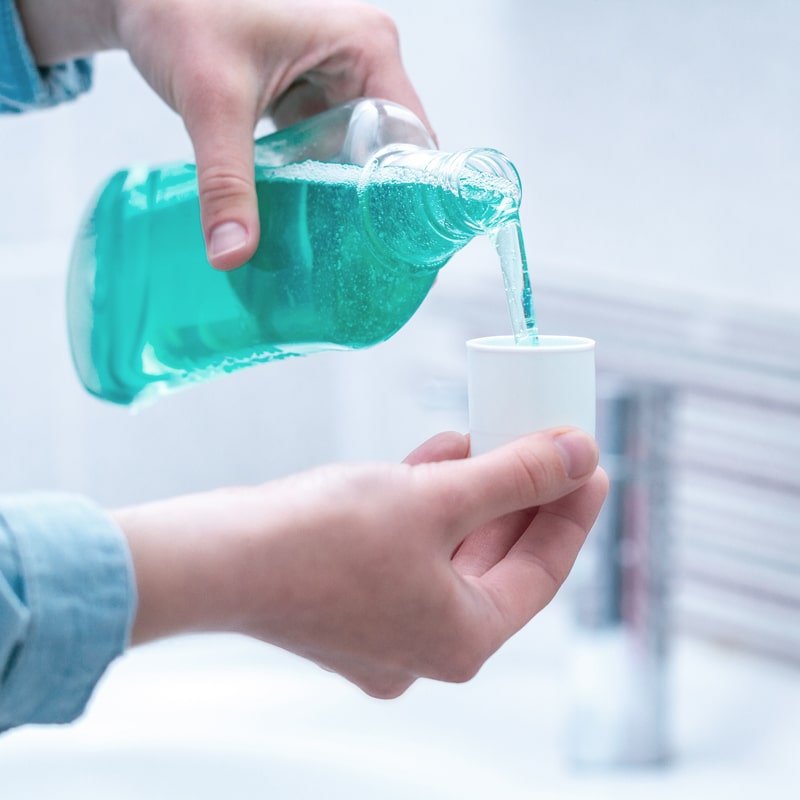Permanently eliminate bad breath
Effective solutions for lasting fresh breath and increased well-being. Put your trust in our many years of experience and innovative approaches to combating bad breath.
- Gentle and effective treatment
- 99.5% success rate with the DR. HAGER | Periodontitis Concept©
- Family practice for 40 years, in 2nd generation


Understanding bad breath: Causes, symptoms and effective treatment options
Bad breath (med.: halitosis) is still a taboo subject. We are embarrassed to talk about it, which means that others rarely point it out to us. In Germany, at least 20% of the population suffer from bad odor from the mouth, but only very few people know about it.
For the person affected, this can mean a significant deterioration in their quality of life as well as an impairment at work and in their social life. Contrary to popular belief, the cause of bad breath does not lie in the gastrointestinal tract, but in 90% of cases in the oral cavity.

“To prevent small problems from becoming big problems, it helps our patients if they come for regular dental check-ups and professional teeth cleaning. In this way, we can rule out the possibility of bad breath becoming a symptom of a more serious disease such as periodontitis.”
Dr. Eva Krapf
What causes bad breath?
Reasons can be:
- Bacteria and tongue coating on the back of the tongue
- Bacteria in the pockets of the gums and in the spaces between the teeth
- Deposits on the surface of the tooth
- Dry mouth and dried out mucous membranes where bacteria can spread
- Periodontitis / periodontal disease and inflammation of the gums
- Mouth sores (possible due to initial infection by herpes viruses)
- Smoking
- Mouth breathing, snoring
- Stress
- Fasting / Diet
- Infections or abscesses in the oral cavity
- Unbalanced diet
- Tonsillitis
Read more
Bad breath can arise from multiple causes. Bacteria remain in one place for a long time without the patient regularly removing them with a toothbrush, dental floss, interdental brushes or dental floss. This can be in the gums and their pockets, between the teeth, on the tongue, in gingivitis or periodontitis areas.
In rare cases, the cause lies in deeper regions, such as the gastrointestinal tract. An unbalanced diet with excessive consumption of sugary, dairy and acidic foods can lead to halitosis in patients. If this persists for a long time, it is also referred to as chronic halitosis.


How do I recognize that I smell from my mouth?
Those affected usually do not notice the odor themselves. Sometimes it is family members or friends who mention the unpleasant odor. If the affected person does not take adequate oral hygiene measures, such as regular, correct tooth brushing, dental floss or tongue cleaning, the only thing that usually helps is a visit to the dentist or professional dental cleaning (PZR), i.e. dental hygiene.
The dentist will then recognize the halitosis in his treatment. In most cases, a dental cleaning is recommended in which tips on correct, daily, personal treatment are taught so that the lack of oral hygiene soon becomes a thing of the past. A bacterial test with a questionnaire can also help to eliminate bad breath in some cases.
However, bad breath is not generally caused by the oral cavity, even though this is the case in 90% of all cases. It can also be caused by odors from the upper respiratory tract, the gastrointestinal tract or the paranasal sinuses. In this case, the dentist usually refers the patient to a general practitioner or ENT specialist.
How does the treatment at DR. HAGER?

Initial examination and consultation
If we, as dentists, detect halitosis in you through a simple intraoral examination, we can suggest an individually suitable, thorough treatment for you. In general, however, it is of the utmost importance to rule out any diseases that may be the cause.
This includes inflammation of the periodontium, which can restrict fresh breath. This disease is called periodontitis. It is also often mistakenly referred to as periodontitis. In this scenario, treatment should be continued with a special periodontitis treatment.

Professional tooth cleaning and individual treatment approaches against halitosis
If the bad breath is only due to tongue plaque or incorrect handling, e.g. of the toothbrush, the immediate treatment is a special professional dental cleaning (PZR), in which gum pockets, interdental spaces and the tongue are freed from bacteria. In addition, antibacterial preparations (e.g. chlorhexidine) are used to remove bacteria that could not be removed by mechanical cleaning.
For long-term therapy, we can determine the actual causes of halitosis together using a questionnaire and then propose a concept for a permanent cure.

Oral hygiene at home
Regular check-ups and professional dental hygiene sessions as well as daily oral hygiene at home with our cleaning set with tongue cleaner.
Also known as a tongue scraper, which can gently remove plaque from the tongue, antibacterial toothpastes, dental floss or, best of all, interdental brushes, which clean bacteria from the gums and teeth, round off a thorough cleaning of the teeth and ensure good oral hygiene with healthy gums.

Ensuring the success of the treatment
Mouthwashes are controversial. In daily advertising, patients are led to believe that these mouthwashes remove the odor of bacteria from the tongue, teeth, gums and the entire mouth. In reality, the good bacteria usually fall victim to the mouthwash.
The “bad” bacteria can usually resist the mouthwash and now remain in place. To ensure the success of the treatment in the long term, the intraoral causes, whether caused by inflammation such as periodontitis, must ultimately be eliminated by professional tooth cleaning, the dentist and the patient themselves in their home care with tongue cleaners and other utensils.
You will be rewarded with fresh, healthy breath and increased self-confidence and can enjoy your new attitude to life from now on.
What helps against bad breath?
Visit to the dentist
The easiest and most effective way is to go to your dentist for an examination and get professional advice on the exact cause of your bad breath. For example, it could be due to bad fillings or tooth decay. If they cannot find a dental cause, they will refer you to a doctor.

What helps against bad breath?
Dental floss, interdental brushes
tongue scraper
Just as important as the toothbrush and toothpaste. Food residues that cannot be removed by conventional brushing can develop an unpleasant odor. Plaque on the tongue can also be removed, very gently please, with a tongue scraper.

What helps against bad breath?
Nutrition
A healthy dental diet can help fight bad bacteria. Avoiding sugar, which is the food source for most bacteria in the mouth and therefore causes tooth decay, would be a good way to combat this. Avoiding dairy and acidic foods can also be helpful.

What doesn't help against bad breath?
Mouthwash
We do not recommend these. As already mentioned in the text above, they tend to be counterproductive. Mouthwash only works against bad breath for the moment but does not eliminate the cause. Furthermore, they should not be used for longer than 2 weeks as otherwise dark discoloration will occur and beneficial bacteria will also be killed off.

What helps against bad breath?
A cold or
taking medication
A cold and the associated mouth breathing (during the day or at night) can lead to bad breath due to dry mouth. Medication can also lead to bad breath. You can clarify this with the doctor who prescribed it for you.

What helps against bad breath?
Brush your teeth
Thorough and regular oral hygiene should always be a matter of course. But it can help effectively with bad breath in particular. Electric toothbrushes are easier to handle and more efficient in their cleaning power. We would be happy to advise you on dental hygiene.

What helps against bad breath?
Drink water
Dry mouth can promote bad breath, so drink plenty of water and stimulate saliva production. At least 1.5 liters of water a day is a good guideline.

We look forward to seeing you!
Are you looking for advice and professional treatment? Would you like to know which treatment is right for you? We will be happy to advise you and help you further.
The easiest way to do this is to book your appointment online.

and the entire Dr Hager team
Frequently asked questions about bad breath
Why do I have bad breath or what causes bad breath?
Bad breath can have many causes. If the oral cavity is not cleaned thoroughly, bacteria can spread and even increase the risk of periodontal disease. It usually helps to use various mouth cleaning utensils. These include, for example, cleaning the tongue with a tongue cleaner to remove plaque, brushing your teeth properly, practicing regular dental hygiene and eating a balanced diet.
How do I know if I have bad breath?
Sometimes you get a tip from friends or family members. Unfortunately, many people hold back to avoid the situation. Even smelling that bad breath usually doesn’t work. That’s why it’s important to attend regular dental hygiene sessions and follow their tips for thorough, proper dental care. Often, not many adjustments need to be made to achieve fresh breath again.
What helps against bad breath?
The simplest answer is to prevent the formation of plaque on the teeth. To prevent this, you should brush your teeth at least twice a day (morning and evening) for 2-5 minutes each time using a soft manual toothbrush or an electric/ultrasonic toothbrush. It is important not to forget to clean the spaces between your teeth, preferably with interdental brushes or dental floss.
Why bad breath in the morning?
As saliva production is greatly reduced during the night, breath generally smells a little strong in the morning. However, this is normal as long as the odor dissipates on its own.
Can periodontitis / periodontal disease lead to bad breath?
Yes, definitely. Periodontitis is caused by bacteria that metabolize waste products. These products are responsible for the bad odor, among other things.
Do tongue cleaners / tongue scrapers really help?
Failure to clean the tongue is usually the main reason for halitosis. Dairy products in particular leave tongue coatings on the tongue, but these are removed with successful treatment using a tongue cleaner. If there is no success, there may be other causes. Ideally, you should then ask your dentist or dental hygienist at your next visit to rule out the possibility of periodontitis/periodontosis, for example.
What to eat against bad breath?
Home remedies that can help against bad breath are: Fresh herbs such as parsley, chew this fresh after a meal. Sage and mint also help and can be drunk as tea. Drink at least 1.5 liters of water or unsweetened tea a day. Citrus fruits also help, but should only be consumed in moderation due to their acidity. A little insider tip is yoghurt (organic yoghurt) because of the lactobacilli it contains, which keep harmful bacteria in the oral cavity and intestines in check and can help against bad breath.
What neutralizes bad breath?
A glass of milk and eating an apple can help against bad breath. Nibbling on roasted aniseed and fennel seeds can also help.

